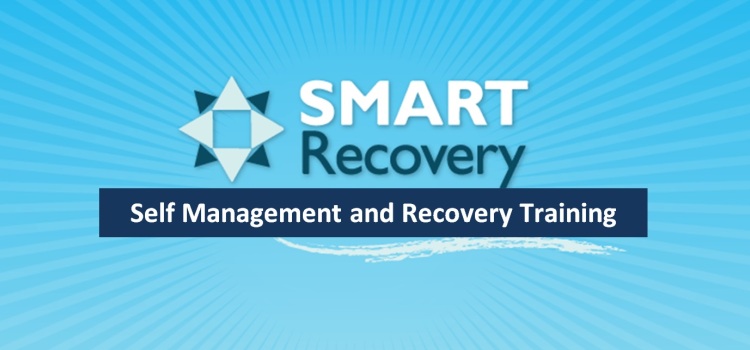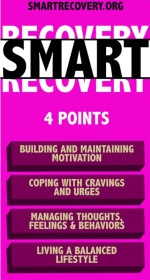Your First SMART Recovery Meeting

By Sam29
First posted on SMART Recovery
So, you’re considering attending a SMART Recovery meeting. We applaud you for reaching this point in your recovery! Your consideration might come with one or a mix of emotions – fear, anticipation, anxiety, excitement, empowerment. Many of us have been there ourselves, and appreciate that these feelings are valid based on where you are in your recovery journey. Rest assured, many thousands of individuals who have gone through our program are so glad that they decided to become a part of SMART Recovery.
Before you attend your first meeting, it may be helpful to get a better understanding of what to expect as a SMART Recovery meeting participant. This article will provide you with:
- An overview of our 4-Point Program
- 10 things that will help you prepare for attending your first meeting
- An answer to the question, “Will SMART Recovery work for me?”
- How to find a SMART Recovery meeting
- General info about SMART Recovery
The SMART Recovery 4-Point Program
 As you may have already seen, the SMART Recovery program is based around our science-based 4-Point Program, which helps individuals gain independence from addiction of all kinds, including substances or activities (behaviors). Our 4-Point Program includes many ideas and techniques to help you change your life from one that is self-destructive and unhappy to one that is constructive and satisfying. Our efforts are based on scientific knowledge and evolve as scientific knowledge evolves.
As you may have already seen, the SMART Recovery program is based around our science-based 4-Point Program, which helps individuals gain independence from addiction of all kinds, including substances or activities (behaviors). Our 4-Point Program includes many ideas and techniques to help you change your life from one that is self-destructive and unhappy to one that is constructive and satisfying. Our efforts are based on scientific knowledge and evolve as scientific knowledge evolves.
The 4 Points include:
- Point 1 – Building and Maintaining Motivation
- Point 2 – Coping with Urges
- Point 3 – Managing Thoughts, Feelings and Behaviors
- Point 4 – Living a Balanced Life
While these points are listed in order, that does not necessarily mean one might go straight through from point 1 to point 4. There may be many ups and downs in a person’s recovery. This is not considered a failure but more about using the tools that are suggested in each of the 4 points to help them get back on track. These tools are also referred to as life tools and can continue to help a person throughout their lifetime.
What You Need to Know Before Attending Your First SMART Meeting
Now that you have been introduced to our 4-Point Program, let’s get you ready to attend a meeting. To help you feel more comfortable about walking into a SMART Recovery meeting (in-person or online) for the first time, we have provided some important facts about our organization’s unique and welcoming approach to meetings.
-
You don’t have to talk if you don’t want to. Our meetings often start with a check-in. Typically, this includes a brief introduction to yourself and how you came across SMART Recovery. Good news – you’re not obligated to check-in. In fact, it’s important to know that you don’t have to talk at all during the meeting if you’re not comfortable doing so. Click here to see a basic meeting outline.
-
Our program does not rely on a higher power. At SMART Recovery, we believe that the power to change addictive behaviors resides within each individual and does not depend upon adherence to any spiritual viewpoint. While this is true, the use of religious or spiritual beliefs and practices in recovery is a personal choice, and many choose to combine their beliefs with our program.
-
Self-management is an important part of our program. As found in our name – Self-Management and Recovery Training – we believe that everyone has the power within themselves to change and to build the life they want to live. You are in charge of your recovery and the decisions you make in your journey. It is also important to understand that we do not require you to accept the guidance of a sponsor, or commit to any requirements other than the goals of recovery that you set for yourself.
-
It doesn’t matter what you’re dealing with – no one will judge or label you. No matter your addiction – drugs, alcohol, shopping, eating, relationships – you can feel comfortable coming to SMART Recovery meetings, interacting with our community and utilizing our tools. You can also feel comfortable knowing that no one will label you an “alcoholic”, an “addict” or “diseased” nor “powerless”, and if you do not believe in a religion or spirituality, that’s fine, too.
-
SMART Recovery focuses on your recovery story and not your war stories. Because we are so focused on the good that you are doing in your life, we will not let you or anyone in our meetings dwell for long on the challenges you’ve faced to this point. Our meetings are focused on helping you get from where you are today to the person you want to become and quality of life you want to have.
-
We won’t judge you for slips, lapses or relapses. At SMART Recovery, we do not believe a lapse or return to usage means you are starting over. Instead, should a recurrence happen, we encourage you to use what is learned to move closer to your end goals. You are always welcome at our meetings and will not feel judged should you find yourself in this situation.
-
We welcome individuals at meetings using appropriately prescribed medications for many purposes. SMART has always welcomed people at meetings using appropriately prescribed medications for many purposes, including treatment of mental health conditions, initial withdrawal from substance use and recovery from addiction.
-
Our meetings belong to the attendees. This means that although there is a facilitator present, the facilitator’s role in the meeting is not to present for an audience, but instead to encourage peer support and discussions amongst the participants. Facilitators often find themselves joining into conversations, explaining and recommending a variety of SMART tools and resources that can be applied to an individual or group’s situation, and simply helping to ensure the meeting keeps moving and is conducive.
-
We have a variety of tools available to aid in your recovery. Tools are a large part of our discussion at meetings. We have several tools available – from a change plan worksheet and a cost/benefit analysis, to role-playing/rehearsing and unconditional self-acceptance. Our tools and techniques are based on cognitive behavioral therapy (CBT) and rational emotive behavioral therapy (REBT). We encourage individuals to find the tools and techniques that work best for you in your journey. Over time, as you continue to master them, they will become a part of your everyday life and these skills will help you cope and deal with troubling situations related and unrelated to your addiction. Click here to view our SMART Recovery Toolbox to see some of the tools and worksheets available.
-
SMART Recovery Online (often seen on our site as SROL) is a great option, too. Perhaps there isn’t an in-person meeting close to your hometown. Or, you feel more comfortable dipping your toe in the water before jumping all in and coming to a meeting. You can feel free to check out our online community, where we have daily online meetings, as well as 24x7x365 message board forums and chat rooms. SMART Recovery is available to you when you need it. Visit smartrecovery.org/community/ to learn more about our online community.
So, will SMART Recovery work for you?
Due to the self-empowering nature of SMART Recovery, we can’t answer that for you. We want it to work for you. It has worked for many others and we believe it can work for you, too. But, the only way you’ll get your answer is if you give it a try and give it your all.
How to Find a SMART Recovery Meeting
In-Person: To locate a SMART meeting near you, visit here: Meetings in your area. Just type in your zip code and you’ll be presented with a map of the meetings within a 50 mile radius of your location. You can adjust your results by changing the radius of the search. You will also see an option to “Toggle Tag Filters” to see only the types of meetings.
Online: To sign up for an online meeting, please visit our SMART Recovery community. SROL respects ones’ anonymity. We also have volunteers monitoring all activities in order to keep SMART Recovery online a safe place for everyone. There is both personal, as in answering questions, and online technical support available, as well.
About SMART Recovery
 Founded in 1994, SMART (Self-Management and Recovery Training) uses science-based techniques that have proven to be effective in helping people recover from addiction problems involving any substance or behavior, including such things as alcohol, drugs, gambling, over-eating, shopping and internet use.
Founded in 1994, SMART (Self-Management and Recovery Training) uses science-based techniques that have proven to be effective in helping people recover from addiction problems involving any substance or behavior, including such things as alcohol, drugs, gambling, over-eating, shopping and internet use.
Each week, many thousands of people discuss recovery progress and challenges at more than 3,000 meetings in 23 countries, 25 online gatherings and 24/7/365 internet message board forums and chat rooms.
Participants use SMART to assume responsibility for their own recovery and become empowered using its 4-Point Program®: building motivation; coping with urges; managing thoughts, feelings and behaviors; and living a balanced life.
For more information, please visit our website: SMART Recovery.

























Funny, I just went to my first SMART meeting a week ago. Prepared to be open and receptive I’m afraid there were a couple of hurdles for me… There were no interaction among the dozen attendees the 10 minutes prior to the meeting start time and the “leader” made a few negative digs at AA during his dialogue… poor form?
I ran into a woman I knew by her service work decades ago – she remarked that she left AA cause she was always pressured to DO something and she’d given and given. She could come and go at SMART as she pleased. Since there is only one meeting here in Winnipeg – (and one leader?) I prefer Refuge Recovery to balance my meeting needs.
Hmm, I confess I got tired of the writing style real early on, and skimmed the rest. Maybe it just seemed too, eh, smart, or something. And frankly, the smart label would make me cringe about as much as the god labels in AA do. Maybe if I was struggling to get sober I’d rather cringe and go to a program called SMART than cringe and go to a program that talks about god all the time, but here many years sober I have involved myself a bit with Lifering as an alternative to AA but “wouldn’t be caught dead” going to a meeting which calls itself SMART.
I have been to several SMART meetings in Edmonton, always at the same place. Here are my conclusions after several decades of sobriety:
– There is not the feeling of fellowship that exists in AA.
– What goes on in the meeting is not that much different from what happens
in AA meetings – people talking about themselves.
– SMART claims to be scientific and proven. The science it claims to be
based on is a social science, not a hard one such as physics. It’s a
science that changes its mind on what constitutes a disorder depending on
the zeitgeist. E.g. homosexuality is no longer a disorder.
– If SMART is so scientific and proven effective why is AA still the biggest dog
in town? There are a couple of hundred AA groups/meetings in Edmonton
and two SMART meetings?
– I think their policy of avoiding promotion of total abstinence is a mistake.
– Their practice of having the same leader at each group does not appeal to
me.
However, if it helps some to get a grip on their boozing I’m all for it. The more variety of recovery groups, the better. Many people get turned off AA for one reason or another, and SMART allows those another option.
I tried Smart Recovery as well as other programs trying to escape AA rhetoric and dogma. In Smart Recovery meetings I found angry, blaming, AA bashing people.
Because I felt they were toxic, I stopped attending Smart Recovery meetings. I did, however, incorporated some of their ideas into my life. I continued attending AA meetings and learned to filter out what was not useful or meaningful and embrace what was. I helped start a secular meeting.
Driven by the desire to live a long, happy, productive, sober life, I have learned to take what is useful anywhere I find it.
I am fortunate to have available to me a wide variety of ways to fight addiction. I believe my success or failure is in my hands.
I’ve only attended a few SMART meetings, in Victoria, B.C. Nice people, good program for newcomers. I didn’t feel it had much to offer someone who’d been sober a good while. Didn’t hear any AA-bashing, and it was made clear that concurrent AA attendance was helpful to some. It’s basically Rational-Emotive Therapy, it seemed to me, well-structured and specific to addiction. It requires trained facilitators because it’s built around specific lists and approaches. Those I met were openminded and noncontrolling.
One of the reasons AA was so helpful to me, compared to what I’ve seen of SMART, is its emphasis on fellowship. I needed frequent reminders that I was an OK person, and people with whom I could build relationships based on common experiences and mutual acceptance. My best friends to this day are AA folks. AA’s emphasis on service and 12th stepping also seemed absent in SMART, and those help me see myself as part of a whole.
Bottom line: Definitely helpful to some people and totally secular. I’m sure some have gotten sober in SMART who wouldn’t have put up with AA’s religiosity. Its materials are well worth an AAer’s time to read and borrow from. Until we have secular AA meetings more widely available, I’m glad SMART is around. The goal is helping people get sober, as we were helped, right?
I have attended many SMART meetings and found no 12 step bashing. Rather, I found the program to be present and forward focused. I subscribe to the monthly email and can join online chat rooms and meetings if I feel the need for encouragement.
AA bashing is HEALTHY to an extent. Not to the exclusion of productive ways forward but it IS part of many people’s story and process. We need to stop being afraid that any and all criticism of AA should automatically be dismissed as “AA bashing”. People have wildly different experiences with their 12 Step program, some very harmful, and debate over the best tools for people to use is a positive phenomenon. No, most SMART meetings aren’t going to spend a lot of time “bashing AA” because they have their OWN program and tools to use. However, listening to someone’s experience with 12 Step programs, especially when they’re new to recovery, is part of how we can get to the heart of how they can approach and work on their problems differently.
I take an AA meeting to a local detox once a month and last week I asked the five guys at my table, ages 17 to 30, if the fentanyl rush is worth dying for? I got a resounding and unanimous “YES” before I finished the sentence. True, they might have been playing me. But I don’t think so, which begs the question, how will they fit in with shop-aholics, marijuana fiends and folks trying to get off Mars Bars? Because for these lunatics a lapse is not just a speed bump on tbe merry road to recovery – it’s a body bag – and I hope SMART has more to offer them than a pat on the head and a let’s try harder next time. They don’t have a next time.